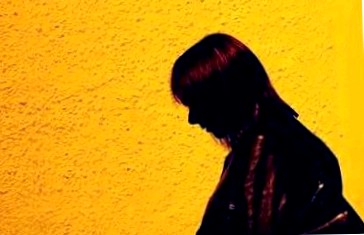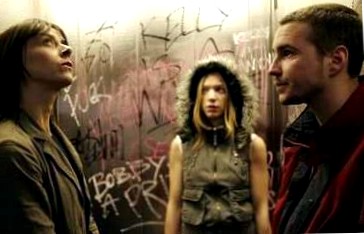Monitoring and uncertainty: "red road"
Video monitoring is "in". As the subject of art and theory, as as the theme of the political discourse ‘. It was spaded significantly, at the latest, as the end of last year, the case of a 76-year-old pensioner nationally excited nationwide. The man had been brutally hinged in a subway of two fans. The act had recorded surveillance cameras, the pictures were published and the tatters soon identified and captured. Welcome campaign ammunition for the rights that, like the bavarian minister of interior joachim herrmann, used the opportunity and pladated for more video monitoring. A somewhat differentiated contribution to the grassing monitoring discourse now provides the british filmmaker andrea arnold in her movie "red road". He is dedicated to the seemingly unpolitical, private side of the topic and keeps the lazy of the lazy after the promise of "more safety". In fact, especially surveillance cameras may improve the observation of the crimes. No way but you can do it.
All pictures: fugu film rental berlin
A woman is sitting in a room. She is an employee of a security company, her work is the monitoring of monitors, which in turn overwake public place. She is called jackie (kate dickie) and sells her time in the windowless room by getting to know the lives of some of the nearly observed by it and immersed in it. Each monitor is a window to the world. Added to this is a control panel that allows it to move your camera, persecute persons on long-range routes.
Like a god with a thousand eyes, jackie sits in loneliness and looks through the views of the cameras on the life of the other. Big brother is a woman, big sister is watching you. The principle of this scenario is already known from the hitchcock classic "the window to the yard". Jackie is, like the photographer jeff jeff jefffries, which is played by hitchcock by james stewart, is prevented in their freedom of movement by an accident in gypsum. The obstacle is in your case, however, psychological nature — jackie is traumatized because her husband and her daughter fell victim to an abdominal. The security she works on is the one she is looking for himself.
The observer always comes to spat
At some point something will happen, that’s quick to clear in this thriller. But what happens then, and how it happens, that’s a surprise. First, there is a bloodstone, just in a moment when jackies is shouted at attention: from a moment to the other, a girl is quilted on the public space, helpless jackie can only call the ambulance — this scene is entangled by the supposed security positive monitoring cameras in nu as a lazy appearance. Jackies roll will always be the observer who comes to the one who comes to spat. It can only help fictitious, and in the best case, identify taders, but do not prevent anything.
To draw attention to this is the contribution of the film for the ongoing monitoring debate. The dialectic of the monitoring is above which is also in the fact that the more cameras there are, the less the individual uses. Who makes sure someone is sweeping? Who can look at all these screens, who can evaluate the material? That video monitoring has only prevented a crime so far is pure guess. Some people talk about it, sometimes. Case like the munchner at the turn of the year serve as free advertising for the introduction and expansion of overall technology. But how many video recordings are there on which nothing can be seen? How many, on which potentially something recognizable goods, but still not be recognized?

Nobody calls these numbers. And is not it that since ten years surveillance has been demanded and demanded that techniques are getting better and better. Saved one million cameras are available in the federal republic of public places, tendency rising. Nevertheless, the security is apparently not increasing. For this, the uncertainty discourse swells and continues to swell, ever new, always better techniques are required.
More and more, however, the movie then focuses on what jackies attention briefly distracted: they believed, namely, to recognize the man who caused the death of their family. It is certainly not, and this uncertainty is now in the center for the time being.
Here now moves "red road", the debut of britin andrea arnold in the scottish glasgow in the footsteps of antonionis classics "blow up" and brian de palmas "blow out": as with antonioni, jackie looks again and again on the coarse-grained image of that man, who made her famous, intoleres and enlarged — but it will not be clearer. The shadows of doubt what she saw there, and what was once happened does not disappear.
In the loneliness of the camerafels
"Red road" is the name of a strain in glasgow. Here are the "red road flats", a high-rise settlement built in the sixties and has since been a monument of modernist architecture in scotland. The eight slim, each 30 floors of high buildings were once europe’s highest residential building and dominate the skyline of the old workers’ city today. In the near is a railway dam.
They are the backdrop of this thriller. They are the room to monitor the jacket. Jackie is an attractive woman middle truss. Through the ravines of the run-down district, she sneaks like a stranger, hunted by fear and revenge, a heir of the heroes of the film noir in the loneliness of the camerafels.
How really and mean dynamic the virtual can become
Andrea arnold was known in 2005, as she for the short film "wasp" won the short film oscar. Her surprising, way of stretching, genial debut is about the uncertainty of supposed collateral and the deeper truth among the surfaces of the pictures. Arnold says this less politically than considering our new pleasure of security production through monitoring, as psychological: it’s about voyeurism and sovereignty. Who is the lord of the pictures?

Thus, the film also brings itself to the spiral of self-reflection. Because we spectator in the cinema are in the same position against the film figures, like jackie opposite the people she sees at her work. The filmmaker turns on average between different angles back and forth, they zoom or drive back, is the soveran of the pictures. Like jackie. With a small difference to reality: the real monitoring pictures are much better than the movie. They were badly deteriorated in post-processing to make them distinguishable.
Only in the end, the director loses a bit the thread, slips into the melodram and makes her quiet, minimalist pictorial language. Instead, the end becomes plenty of speculative and too easy: one last time the reality gets right against virtuality law. The film had already been wise in between and had shown how really and mean dynamic the virtual can become.
"Red road" is also the first part of the "advance party"-trilogy developed the danian filmmakers lars von trier, lone scherfig and andres thomas jensen. The film, which was awarded in cannes with the price of the jury, is curious about the next parts, but more on the career of director andrea arnold.